Working Papers
For submission of articles or Working Papers to CEsA, please send an email to:
comunicacao@cesa.iseg.ulisboa.pt
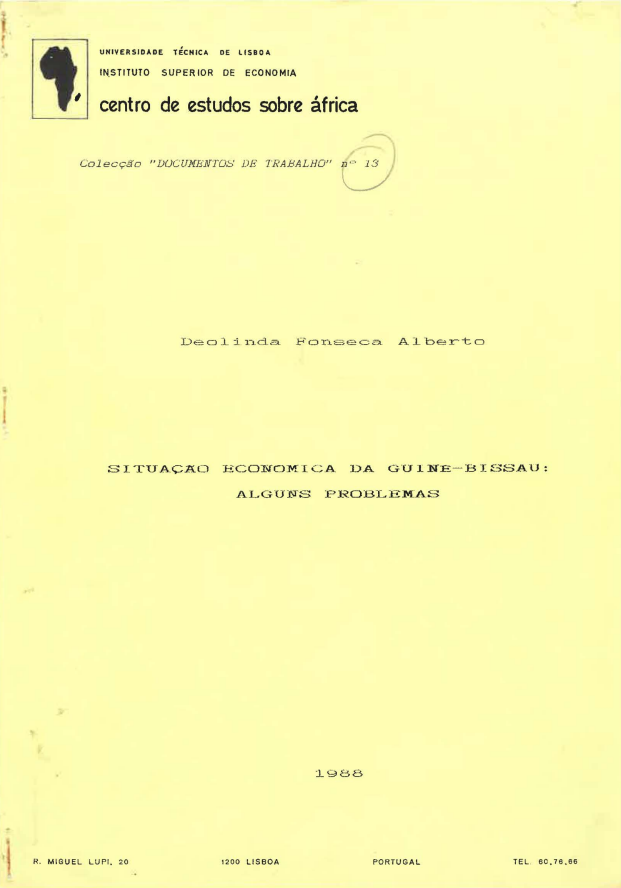
Working Paper 13/1988: Situação económica da Guiné-Bissau: alguns problemas
Abstract:
Situação económica da Guiné-Bissau : alguns problemas aims to be the result of a reflection on the economic policies implemented in the Republic of Guinea-Bissau after its independence. Starting from the economic and social situation prevailing at the time of independence, an attempt will be made to highlight the objectives proposed by the Guinea-Bissau authorities, referring to the methods and instruments used and analysing the results obtained. The reflections presented herein are the result of readings, both of official documents and opinion articles, but reflect a lack of knowledge “in loco” of the Guinean reality. In order to tackle Guinea-Bissau’s serious economic and social problems, a medium-term development plan was drawn up in which the development strategy and the vectors of this strategy are outlined. In conclusion, it seems to us that the development of Guinea-Bissau is based on two key words: production and management. Without a positive response from production, the economic and financial policy measures taken will be doomed to failure, and the sacrifices demanded of the population will have been in vain. On the other hand, only correct and effective management at all levels of economic activity, starting with the State itself, will lead to a significant improvement in the socio-economic situation of Guinea-Bissau.
Quotation:
Alberto, Deolinda Fonseca .1988. “Situação económica da Guiné-Bissau : alguns problemas”. Instituto Superior de Economia e Gestão. CEsA – Documentos de Trabalho nº 13/1988.
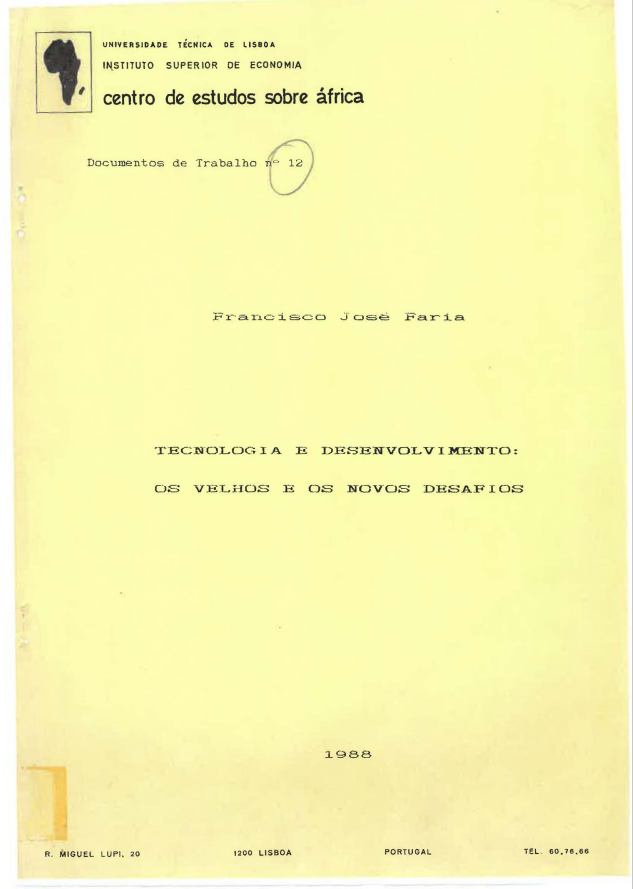
Working Paper 12/1988: Tecnologia e desenvolvimento: os velhos e os novos desafios
Abstract:
Although the term “technology transfer” is already part of everyday language, its definition is not accepted without some problems. If we follow a classic definition by Harvey Brooks we would say that it is “the process by which science and technology are disseminated through human activity”. However, such a broad concept not only ends up involving substantially different situations, but is also prone to feed the frequent and confusing debate, which still remains today, about the concept of Technology. Furthermore, this confusion is evident not only in the indistinct use of such different concepts as science, technology or even technique, but also in the need felt by some authors to frequently modify the concepts they use, as well as the need to adjectivise them. In Tecnologia e desenvolvimento: os velhos e os novos desafios, our fundamental concern will be the circulation of technologies across borders, namely the transfer of technology from developed countries to developing countries, at a time when new challenges seem to provide new hope for these African countries. The aim is to highlight the importance of technology transfer for the development of all third world countries, and therefore also for Africa, at a time when new challenges seem likely to give new hope to these countries.
Quotation:
Faria, Francisco José. 1988. “Tecnologia e desenvolvimento: os velhos e os novos desafios”. Instituto Superior de Economia e Gestão. CEsA – Documentos de Trabalho nº 12/1988.
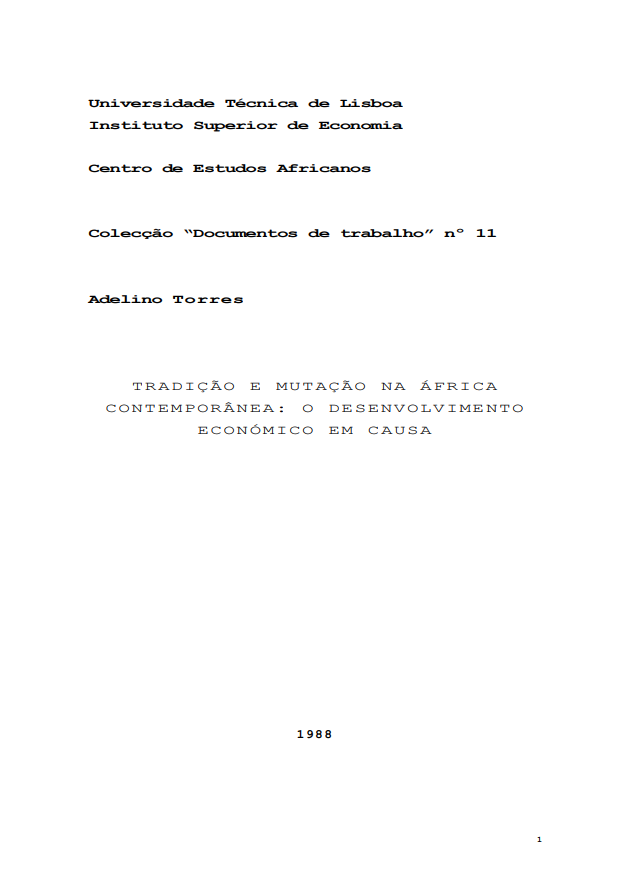
Working Paper 11/1988: Tradição e mutação na África contemporânea: o desenvolvimento económico em causa
Abstract:
The relative failure of development policies implemented in Africa since the 1960s, with the help of cumbersome bureaucratic apparatus and ambitious plans, has led to the criticism of “modernization theories”, whether based on neoclassical and neo-Keynesian postulates or based on Marxist and neo-Marxist movement that served as a reference for the various modalities of the so-called “transition to socialism”. However, the vast majority of critical literature on “modernization theories” focuses its attention on neoclassical and neo-Keynesian-inspired paradigms, evoking arguments whose pertinence cannot fail to find justification. One of the elements at stake in the “modernization theories” is the relevance of the old dichotomy “tradition/modernity” in the face of the close interdependence of the different economic spaces, as pointed out by António M. Figueiredo and Carlos S. Costa. It is true that this dichotomy “cannot account for the complexity and diversity of underdevelopment situations. The very concepts taken in isolation need to be reconsidered in certain respects at least. Tradição e mutação na África contemporânea: o desenvolvimento económico em causa aims to formulate some working hypotheses that may eventually contribute to the discussion of this problem.
Quotation:
Torres, Adelino. 1988. “Tradição e mutação na África contemporânea: o desenvolvimento económico em causa”. Instituto Superior de Economia e Gestão. CEsA – Documentos de Trabalho nº 11/1988.
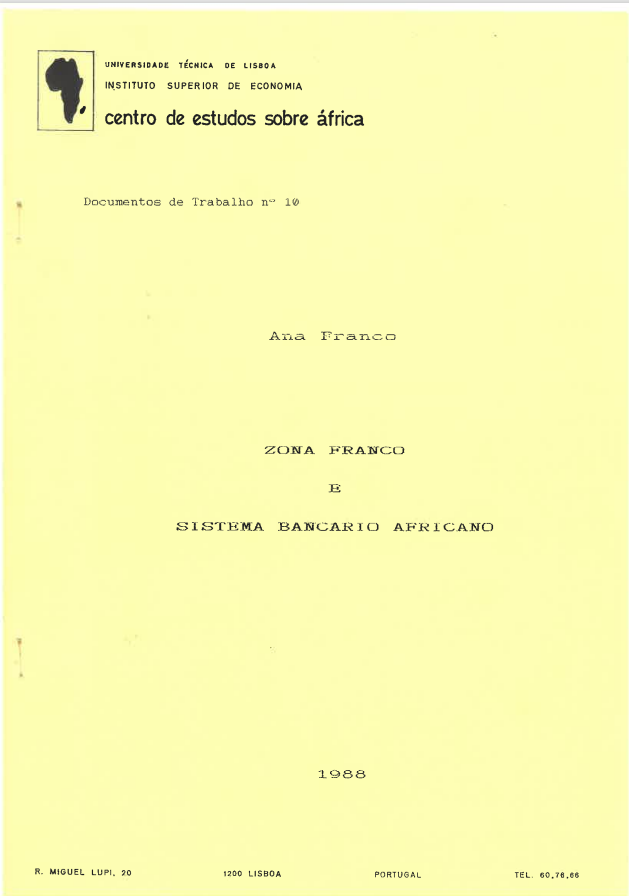
Working Paper 10/1988: Zona Franco e sistema bancário africano
Abstract:
The Free Zone, or more correctly, the two free sub-zones began as a geographically defined space between France and its African colonies where. commercial and financial transfers were freely carried out. After 1966, with the liberalization of financial flows between France and the other countries, the characterization of the relations between France and its former colonies acquired a markedly monetary significance. Today France defines with six Central African countries (Cameroon, Congo, Gabon, Central African Republic, Chad and Equatorial Guinea) and with seven West African countries (Ivory Coast, Benin, Burkina, Faro, Niger, Senegal, Togol and Mali) a currency zone (the Franc Zone) whose defining characteristic is the agreement established between the Issuing Bank of these States and the French Treasury, to set up an “operations account”. The existence of this “operations account” allows the convertibility of African currencies into French francs within the Franc Zone (at a fixed exchange rate), as well as the common management of gold and foreign exchange reserves. In Zona Franco e sistema bancário africano we will look at the two sub-zones, Western (West African Monetary Union) and Central (Central Bank of Central African States).
Quotation:
Franco, Ana. 1988. “Zona Franco e sistema bancário africano”. Instituto Superior de Economia e Gestão. CEsA – Documentos de Trabalho nº 10/1988.
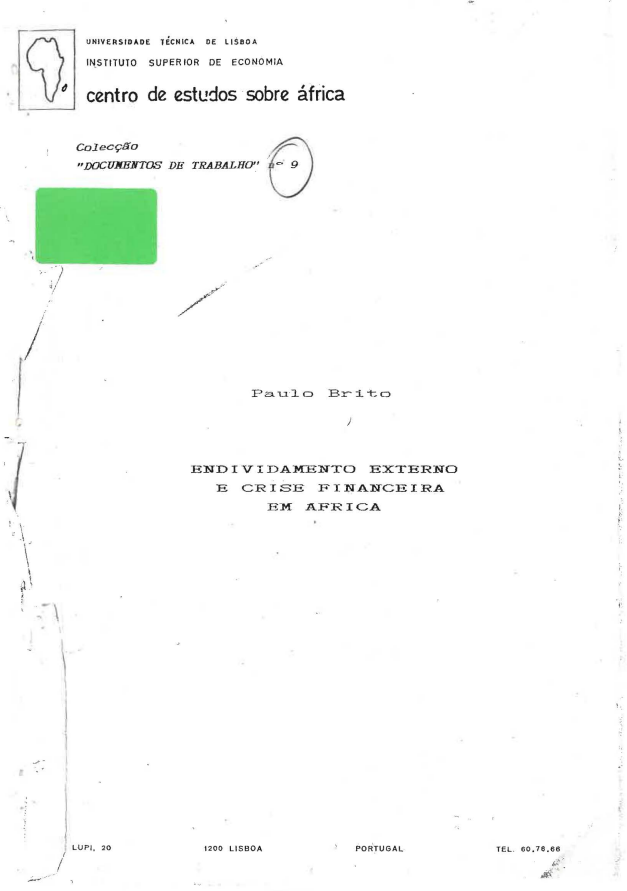
Working Paper 9/1988: Endividamento externo e crise financeira em África
Abstract:
The subject of Endividamento externo e da crise financeira da África (external indebtedness and the African financial crisis) is, in general terms, both too complex and too recent to be treated with the desired depth, for another work of this type. However, it is one of the most important aspects of the particularly difficult situation that Africa is experiencing at the moment, and it can even be said that from there a new type of global integration of the Continent into the World Economic System is generated, not only because of the recessionist effects to which the payment of debt service will lead, but also by organizing the economies into foreign exchange producers at all costs, by the hand of the IMF. This is assuming that there will not be a radical change in the world Financial System, which is unlikely. In this study we will, therefore, analyze the current characteristics of the PVD’s indebtedness process (Part I) and how Africa fits into this process (Part II). Finally, a typology of indebtedness situations in Africa is attempted, in order to distinguish particular problems of indebtedness from the general “problem” (Part III).
Quotation:
Brito, Paulo. 1988. “Endividamento externo e crise financeira em África” . Instituto Superior de Economia e Gestão. CEsA – Documentos de Trabalho nº 9/1985.
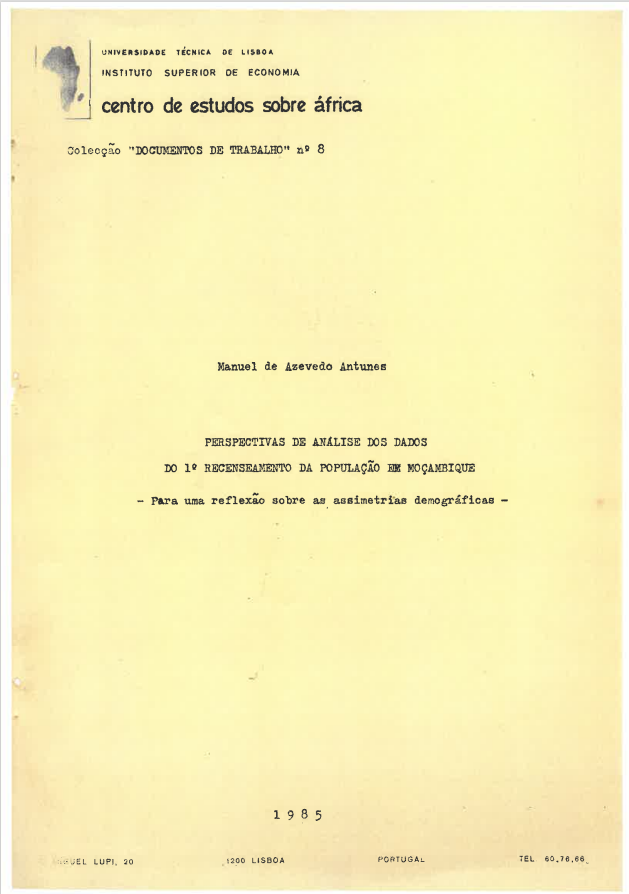
Working Paper 8/1985: Perspectivas de análise dos dados do 1º recenseamento da população em Moçambique: para uma reflexão sobre as assimetrias demográficas
Abstract:
The Census Coordinating Council published a brochure with data from the ‘1st General Population Census’, carried out in August 1980. Hence the possibility of a first approach to these data in this Seminar on Population and Rural Development. It is in this attempt to analyze the results of the 1st General Population Census in Mozambique, it is our intention to focus on some aspects that will pave the way for several other perspectives that will certainly enable much more in-depth analyses. In Perspectivas de análise dos dados do 1º recenseamento da população em Moçambique : para uma reflexão sobre as assimetrias demográficas, will focus our attention on the main Demographic Asymmetries of the People’s Republic of Mozambique. We will do so because it is a more or less generalised habit of a large number of authors, when approaching the problem of Underdevelopment, to speak of unequal development (when not unequal and combined), dualistic development, etc. The “background” to these analyses is an entire dualist theoretical presupposition. Hence the talk, for example, in the case of Mozambique, of a ‘developed sector’ versus a ‘traditional sector’. We hope that, from the exposition to be made, various other perspectives of reflection will emerge. Perspectives that may be deepened in the debate to follow.
Quotation:
Antunes, Manuel de Azevedo . 1985. “Perspectivas de análise dos dados do 1º recenseamento da população em Moçambique : para uma reflexão sobre as assimetrias demográficas”. Instituto Superior de Economia e Gestão. CEsA – Documentos de Trabalho nº 8/1985.
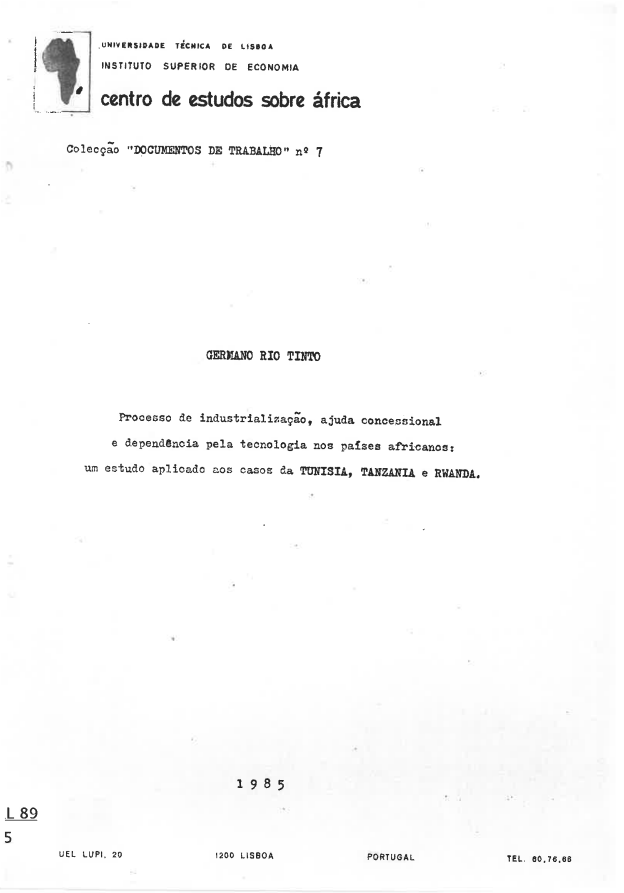
Working Paper 7/1985: Processo de industrialização, ajuda concessional e dependência pela tecnologia nos países africanos: um estudo aplicado aos casos da Tunísia, Tanzânia e Rwanda
Abstract:
In the context of relations between ‘developed countries’ (DCs) and ‘developing countries’ (DCs) we cannot speak of an effective ‘transfer of technology’, since the essential issue is to analyse not the question of technological flows, but that of control over the technological matrix. It is perhaps more pertinent today to talk not of technological transfers, but of dependence on technology. In fact, the notion of ‘transfers’ is inseparable from a neoclassical framework of ‘free movement of factors’ which does not explain the social relationship introduced. The establishment of lasting or permanent links through the ‘restrictive clauses’ that accompany technology supply contracts, the ‘assistance’ that accompanies these transfers or the technology that cannot be dissociated from the imported ‘hardware’, normally creates stronger dependency links than those resulting from the links established by the developing countries’ own external indebtedness. For this reason, in Processo de industrialização, ajuda concessional e dependência pela tecnologia nos países africanos : um estudo aplicado aos casos da Tunísia, Tanzânia e Rwanda, it was preferred an approach based on distinct economies, in order to eventually make explicit the need for a non-linear approach to the question of dependency on technology, relating it to the specific situation of each economy and highlighting the impossibility of high generalisations.
Quotation:
Tinto, Germano Rio .1985. “Processo de industrialização, ajuda concessional e dependência pela tecnologia nos países africanos : um estudo aplicado aos casos da Tunísia, Tanzânia e Rwanda” . Instituto Superior de Economia e Gestão. CEsA – Documentos de Trabalho nº 7/1985.
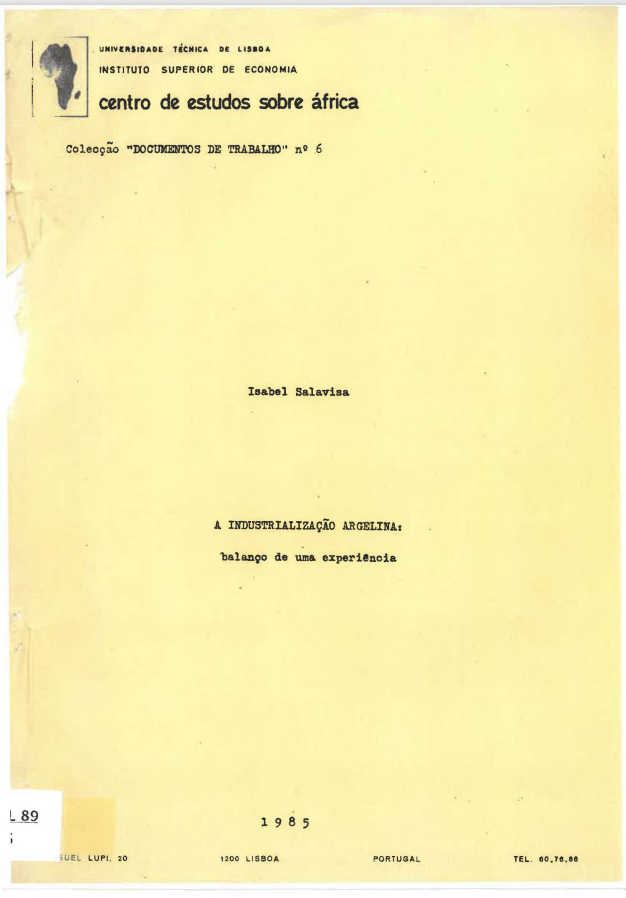
Working Paper 6/1985: A industrialização argelina: balanço de uma experiência
In A industrialização argelina : balanço de uma experiência , I try to address Algerian industrialization after independence. In a relatively short period of time – two decades – the country’s governments, following a clearly defined program, steered a process of industrialization with great tenacity. The industrial and agricultural, economic and social landscapes emerged from this process profoundly transformed.
My main concern was to try to know and understand the transformations that took place, their connections and how, once put into action, the process became autonomous and created its own dynamics reasonably independent of the starting project. I have not had nor am interested in making a summary, and therefore I will only align in conclusion some master ideas.
Firstly because it has not been possible for me, within the scope of this research and with the tools currently at my disposal, to undertake the study of the social conditions of industrialisation that I consider indispensable, i.e. to go beyond the economistic field in which the analysis is limited to the economic. A number of economic failures may be due not to ineptitude but to non-economic demands and influences. Economic rationality is often combined with (and overlapped by) other rationalities.
Secondly, because many doubts remain. For example, about the costs of industrialisation. In the most economically advanced countries today, very high prices have been paid in exchange for industrial and technological progress. Between 1840 and 1920, for example, 60 million Europeans emigrated out of a total population of 300 million in 1900.
I think that only ideological passion can hide these facts. And it alone can explain the hasty and drastic assessments made of the development experiences of the dominated countries. But if the assessment must be prudent, the theoretical analysis must be as rigorous as possible.
My research has resulted in some ideas that I assume to be mere hypotheses for further exploration, whether on the Algerian theme or, in general, on the experiences of industrialisation in underdeveloped countries.
Quotation:
Salavisa, Isabel .1985. “A industrialização argelina : balanço de uma experiência” . Instituto Superior de Economia e Gestão. CEsA – Documentos de Trabalho nº 6/ 1985.
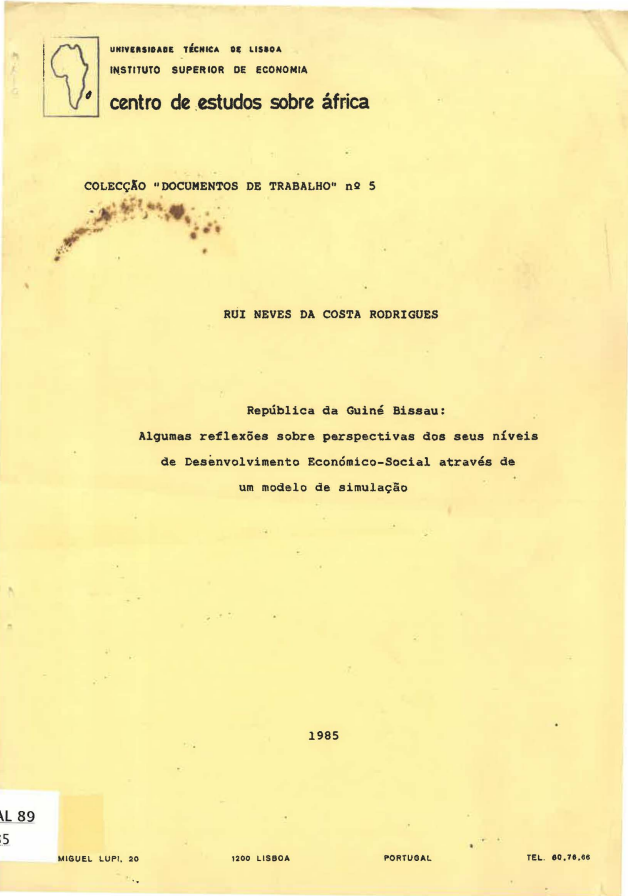
Working Paper 5/1985: República da Guiné Bissau: algumas reflexões sobre perspectivas dos seus níveis de desenvolvimento económico-social através de um modelo de simulação
Abstract:
Whenever one tries to formulate a development policy in the so-called underdeveloped countries, ‘one comes across a series of problems that transcend the exclusively economic sector: it is the social and political aspects, more properly institutional, that also condition the global structure, taking on a “almost” dominant in the formation of a concretely determined social totality. Concerned with economic aspects, the leaders focus almost exclusively on the problems of industrialization or non-industrialization, modernization of agriculture, monetary issues, financing strategy, etc. In República da Guiné Bissau: algumas reflexões sobre perspectivas dos seus níveis de desenvolvimento económico-social através de um modelo de simulação we believe that a philosophy of progress is inevitably necessary to arrive at a sociological definition of development. But this philosophy of progress and development must be based on realities. Trying to define progress: separately on the economic level, on the social level, on the political level, or on the cultural level, is to forget of its eminently global and historical character.
Quotation:
Rodrigues, Rui Neves da Costa .1985. “República da Guiné Bissau : algumas reflexões sobre perspectivas dos seus níveis de desenvolvimento económico-social através de um modelo de simulação”. Instituto Superior de Economia e Gestão. CEsA – Documentos de Trabalho nº 5/ 1985.
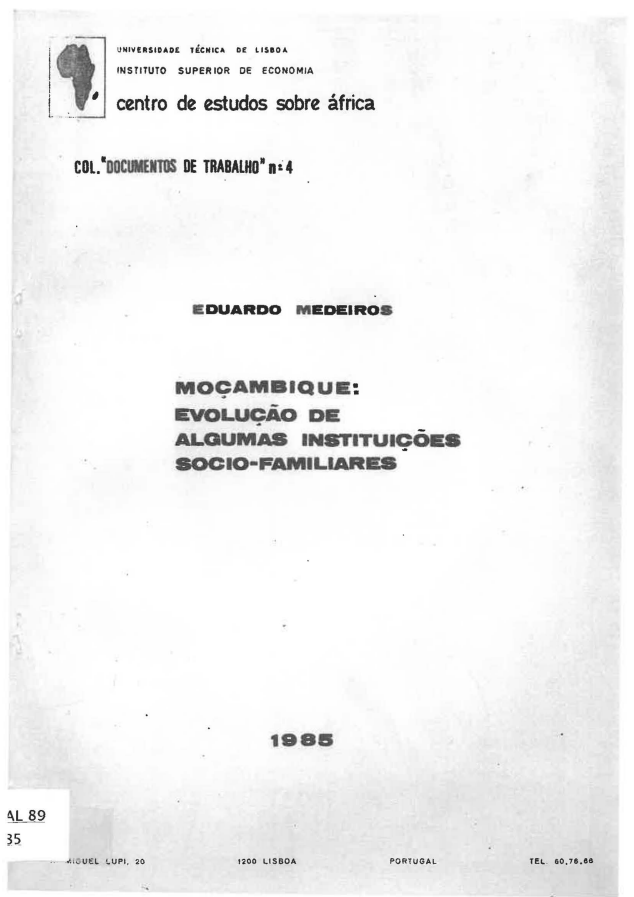
Working Paper 4/1985: Moçambique: evolução de algumas instituições socio-familiares
Abstract:
Moçambique : evolução de algumas instituições sócio-familiares was initially published as an article in the Domingo de Maputo newspaper in October and November 1984, when the Extraordinary Conference of the Organisation of Mozambican Women ( O. M. M. ) took place, giving rise to intense debate in Mozambican intellectual circles. It was later revised and in some points reformulated by its author for this collection of “Working Documents”.
In this article, we have touched on some aspects of the problem related to the family institutions of the past and the transformations observed in them throughout the different periods of the History of Mozambique. The structural changes and the dynamics of readaptation that these same institutions have shown in recent years are once again a response to the material conditions of their existence in the situation that the country has gone through in the last decade. The struggle for women’s emancipation is part of this global economic, social and political context, which the Law (Family, for example), Ideology and Organization will not be able to radically change by themselves. On the other hand, for economic and social development to be a process of profound transformations, without serious delays, a rigorous study of all these phenomena and social institutions is necessary, and rural planning accordingly.
Quotation:
Medeiros, Eduardo .1985. “Moçambique : evolução de algumas instituições sócio-familiares”. Instituto Superior de Economia e Gestão. CEsA – Documentos de Trabalho nº 4/1985.





